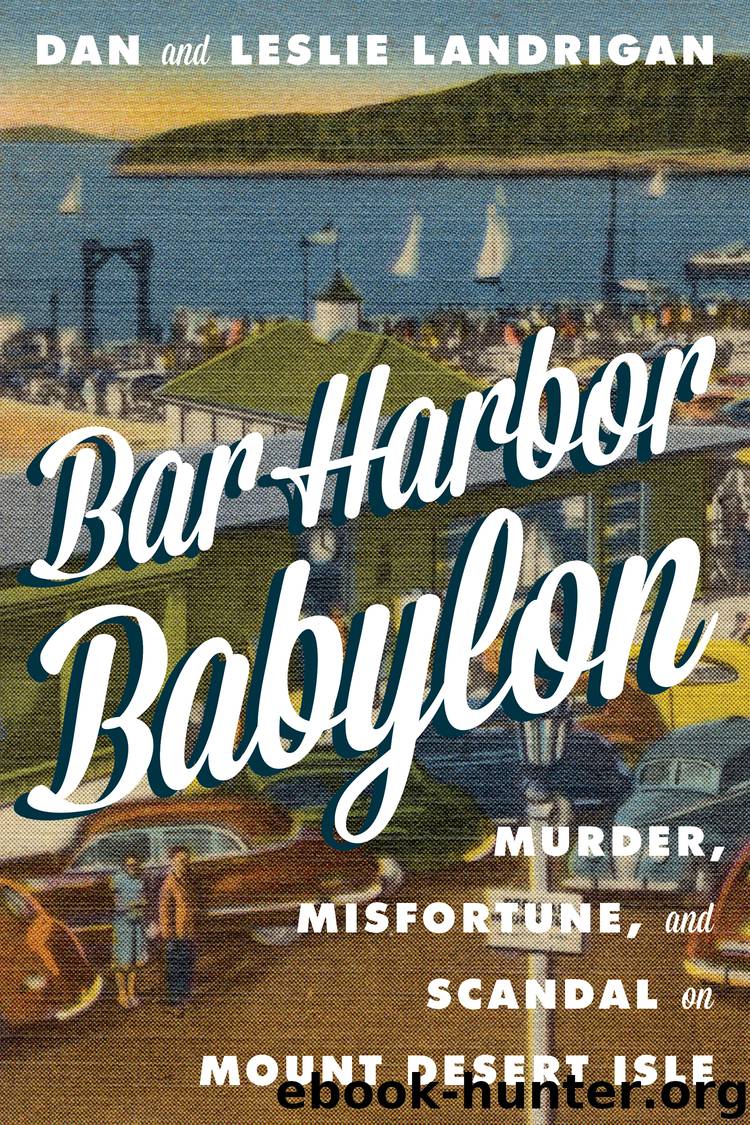Bar Harbor Babylon by Dan Landrigan & Leslie Landrigan

Author:Dan Landrigan & Leslie Landrigan [Landrigan, Dan & Landrigan, Leslie]
Language: eng
Format: epub
Publisher: Down East Books
Published: 2019-02-13T16:00:00+00:00
Mount Desert Welcomes the KKK
Crosses burning? White robes and hoods? Racist rallies? Northeast Harbor? Yes, yes, yes, and yes. It was 1926, and Fulton J. Redman ran for the US Senate from Bar Harbor with the promise to support the principles of the Ku Klux Klan.
Heading into the Roaring Twenties, the KKK was largely moribund in Maine, as elsewhere. But a dramatic image makeover brought the organization to life, and its growth was eye-popping. Maine, it turned out, was fertile soil for its message.
Redman, a summer resident of Bar Harbor since childhood, thought he could take the KKK’s message of hate all the way to Washington. F. Eugene Farnsworth, a charlatan with a gift for public speaking, would show him the way.
In 1923, Farnsworth had moved to Portland to run a local chapter of the Ku Klux Klan and serve as the state’s King Kleagle. Farnsworth gave his first speech in Portland in January of that year, and in twelve months he built the Hooded Order’s membership to twenty-three thousand. The Klan reached its peak in 1925 with more than a hundred thousand members in Maine.
In fact, during the 1920s, Maine had the biggest Klan chapter in the country outside of the South. Nearly one in five Mainers was a dues-paying member. Its popularity didn’t last long, just long enough to stain the reputation of the state—and of Mount Desert.
That Old-Time Religion
Unlike the South, where African Americans bore the brunt of the KKK’s bigotry, their primary target in Maine was Catholics.
Decades before the KKK experienced its resurgence, another politician who summered in Bar Harbor was perfecting the fine art of religion baiting. As Speaker of the US House of Representatives, James G. Blaine introduced an amendment to the US Constitution that banned the use of tax dollars to fund parochial schools.
The Blaine Amendment passed the House in 1875 but failed in the US Senate. The proposal caught on in the states, however, and passed as a law or constitutional amendment in all but eleven states. (Ironically, Maine was one of the eleven that didn’t adopt the policy.) Blaine’s exploitation of anti-Catholicism came back to haunt him when he ran for president of the United States in 1884. He aligned himself with anti-Catholic voters, and his attacks on “Rum, Romanism and Rebellion” cost him the Irish vote and the election. Ironically, Blaine’s mother was Catholic, and his sister was a nun.
Maine’s history of anti-Catholicism goes all the way back to the arrival of the English Puritans, no fans of the French nor the Pope. Hostility toward Catholics blossomed again with the influx of Irish immigrants beginning in 1830, and it continued with the wave of French Canadians from Quebec starting around 1840. By the 1850s, the anti-immigrant Know Nothing Party was flourishing in the state.
For decades in the nineteenth century, spasms of violence erupted sporadically against Catholics in Maine. For example,
In 1834, an anti-Catholic riot broke out in Bangor.
In 1854 in Bath an anti-Catholic mob set the Old South Catholic Church on fire.
Download
This site does not store any files on its server. We only index and link to content provided by other sites. Please contact the content providers to delete copyright contents if any and email us, we'll remove relevant links or contents immediately.
| Espionage | Hoaxes & Deceptions |
| Murder & Mayhem | Organized Crime |
| Serial Killers | White Collar Crime |
Mindhunter: Inside the FBI's Elite Serial Crime Unit by John E. Douglas & Mark Olshaker(9324)
Wiseguy by Nicholas Pileggi(5770)
Room 212 by Kate Stewart(5105)
Hitman by Howie Carr(5089)
Secrecy World by Jake Bernstein(4742)
Killers of the Flower Moon: The Osage Murders and the Birth of the FBI by David Grann(4441)
Papillon (English) by Henri Charrière(4263)
Breaking Free by Rachel Jeffs(4216)
Killers of the Flower Moon by David Grann(4043)
Say Nothing by Patrick Radden Keefe(3975)
American Kingpin by Nick Bilton(3876)
The Secret Barrister by The Secret Barrister(3699)
Molly's Game: From Hollywood's Elite to Wall Street's Billionaire Boys Club, My High-Stakes Adventure in the World of Underground Poker by Molly Bloom(3533)
Mysteries by Colin Wilson(3448)
In Cold Blood by Truman Capote(3378)
Signature in the Cell: DNA and the Evidence for Intelligent Design by Stephen C. Meyer(3132)
I'll Be Gone in the Dark by Michelle McNamara(3082)
Rogue Trader by Leeson Nick(3040)
Bunk by Kevin Young(2993)
